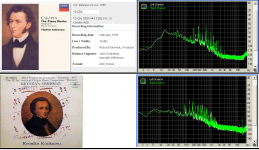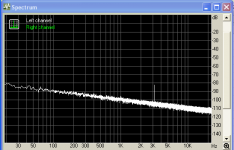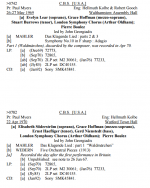I don't hear any beeping, not in the full tracks nor in your samples. I do hear the wind player(s) take a breath just before playing, but no beeps or tones.
Its weird isn't it. I've just tried it again on the main system and its so so obvious, there is this Morse code type bleeping in the left channel, faint yes, but so very noticeable.
George can spot it in the FFT now its pointed out but honestly guys, as soon as I started playing the tracks I thought 'what's that darned bleeping that's going on over there'. Its like someone keying an oscillator with varying length beeps....
beep beeeep beep beep beeeeeeep beep beep beeeep.
George can spot it in the FFT now its pointed out but honestly guys, as soon as I started playing the tracks I thought 'what's that darned bleeping that's going on over there'. Its like someone keying an oscillator with varying length beeps....
beep beeeep beep beep beeeeeeep beep beep beeeep.
Somewhere in one of my Decca box sets is a note about when they started to use a HPF to remove the rumble. I'll try and dig it out. I've never had a truly full range system, but that will change soon when a delayed project gets implemented.
Entirely off the topic, but advice from those who have some inkling about me, do I use Ed or Edward for my short bio?
Stick with what your like to introduce yourself as. Personally I think Edward sounds too British.
Somewhere in one of my Decca box sets is a note about when they started to use a HPF to remove the rumble. I'll try and dig it out. I've never had a truly full range system, but that will change soon when a delayed project gets implemented.
Hoping to come across this rumble in some of my recordings. I'm pretty sure I've heard it somewhere on one of these Ashkenazy recitals.
OK, so this is the kind of thing I'm hearing, and don't play it loud if you give it a listen. Its just as defined as this in Georges recording although obviously at much lower level.
Attachments
Entirely off the topic, but advice from those who have some inkling about me, do I use Ed or Edward for my short bio?
You go by Ed almost exclusively, right? So unless the bio is supposed to be super formal/rigid (where you list every possible degree and award you've ever gotten) where Edward might be more appropriate, I'd stick with Ed.
I'm the opposite, preferring my full name, and there's so many of you to train. 😀 (I really, really don't mind)
As far as the beeping sound, I look forward to seeing what's going on. Certainly seems exceptional.
Around the 8:50 mark I can now hear the beeping referred to. Interesting. More research needed, but sure we will get to the bottom of this.
EDIT: reading the history of kingsway hall they had a lot of problems with traffic noise. Possibly drivers going 'beebdy beep beep' on their horns at a junction?
EDIT: reading the history of kingsway hall they had a lot of problems with traffic noise. Possibly drivers going 'beebdy beep beep' on their horns at a junction?
Last edited:
It is there, and it is not only the 40-50Hz bump, it’s mostly the 10-20Hz bump, true ‘rumble’.(opening of Chopin scherzo No 1 in B minor as I listen for Bills rumble as Ashkenazy tinkles the ivories).
Chopin, Scherzo No. 1 in B minor Op. 20 (7m3s-7m6s)
Notice, this is from ADD CD (no arm-cartridge resonance to interfere).
For comparison, an FFT from the same musical piece, same part of the composition, same duration, from another ADD CD of that era, Zimerman 1975 Warsaw
George
Attachments
As someone who has never lived in London and just visits there I still find tube rumble when I hear it 'live' slightly unnerving. I am a country boy at heart.
Karl, I had your synthesized track attenuated by a whooping 90dB, I had to mix it with low level pink noise (0.009in Audacity) and then attenuate the mix by another 6db for to reach what it’s FFT looks somewhat like the recording’s FFT (as in post #89679).although obviously at much lower level.
Does this too drive you mad? 🙂
George
Attachments
Around the 8:50 mark I can now hear the beeping referred to. Interesting. More research needed, but sure we will get to the bottom of this.
EDIT: reading the history of kingsway hall they had a lot of problems with traffic noise. Possibly drivers going 'beebdy beep beep' on their horns at a junction?
 at least I feel I'm not going mad now.
at least I feel I'm not going mad now. The noise sounds purely electronic in nature to me although I have no doubt what you say about extraneous noises having been a problem at the venue.
It is there, and it is not only the 40-50Hz bump, it’s mostly the 10-20Hz bump, true ‘rumble’.
Chopin, Scherzo No. 1 in B minor Op. 20 (7m3s-7m6s)
Notice, this is from ADD CD (no arm-cartridge resonance to interfere).
For comparison, an FFT from the same musical piece, same part of the composition, same duration, from another ADD CD of that era, Zimerman 1975 Warsaw
George
Thanks George. I'll slowly give some of the Ashkenazy stuff a listen and see if I can pick out the bit I was thinking of. One of the pieces also has what I always suspected to be sparrows chirping in the background. Either that or the Steinway was in need of some WD40 on the pedals 😀
Karl, I had your synthesized track attenuated by a whooping 90dB, I had to mix it with low level pink noise (0.009in Audacity) and then attenuate the mix by another 6db for to reach what it’s FFT looks somewhat like the recording’s FFT (as in post #89679).
Does this too drive you mad? 🙂
George
That sounds just like I am hearing on your recordings. Its odd that its so audibly apparent mixed in with all the surface noise and music but it is.
It is just left channel I think as there were not any right channel noises I could detect.
Around the 8:50 mark I can now hear the beeping referred to. Interesting. More research needed, but sure we will get to the bottom of this.
EDIT: reading the history of kingsway hall they had a lot of problems with traffic noise. Possibly drivers going 'beebdy beep beep' on their horns at a junction?
Well, the Pierre Boulez recording (CBS 72773), side 1 of which I uploaded from an Italian vinyl pressing playback, was recorded at Walthamtstow Assembly Hall (see attachment, upper part)
If anyone has a record with Part 1 (see attachment, lower part), please PM me
Gift: Last revision of an invaluable index (classic music lovers, file it)
https://web.archive.org/web/20090325143507/http://lso.co.uk/downloadables/lumps/upload/492-88.pdf
George
Attachments
I am listening to the 3 files now,
…
Thank you Michael.
I am in agreement with you 100%.
The software RIAA seems promising. I will look into it further but first for making honest and meaningful comparisons I have to quiet down the analog RIAA some more (it seems there is a slight ground loop problem, see the FFTS at post #89650) or build another analog RIAA and another flat head-pre 😱
Might not even be the difference in the filtering, just maybe in the front end amp?
No, because the front end amp (23.5dB flat head-preamplifier) is in the circuit on both the analog RIAA and digital RIAA recordings.
George
at least I feel I'm not going mad now.
Now we have two (thus spoke the deaf)
😀😀
Well, I’d better do something useful today, Karl you are a bad influence
George
- Status
- Not open for further replies.
- Home
- Member Areas
- The Lounge
- John Curl's Blowtorch preamplifier part II



